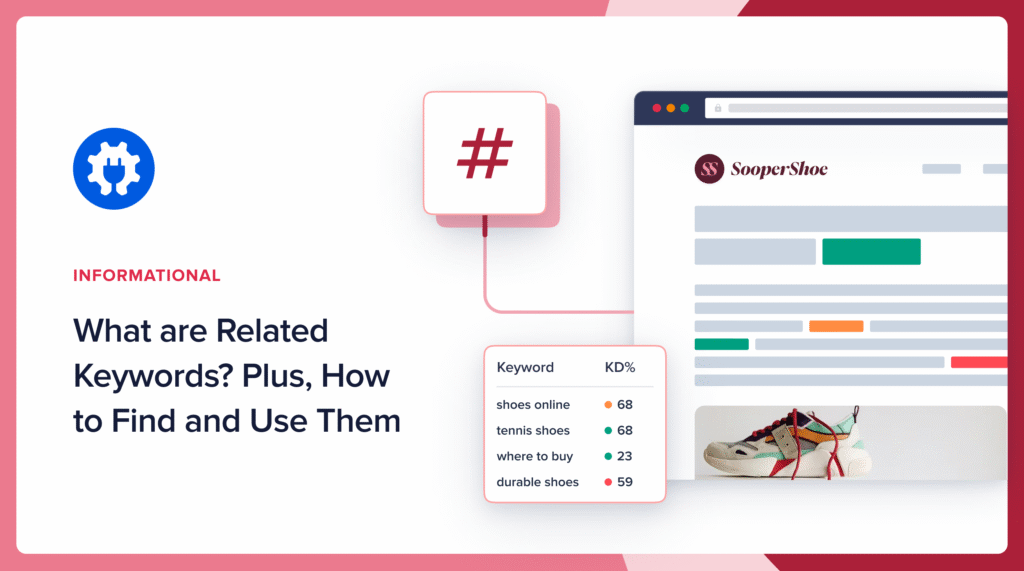What are related keywords?
Understanding and utilizing related keywords is an important aspect of boosting your content's visibility and relevance. As a result, you rank higher in search engine results and drive more organic traffic to your site.
In this blog post, I’ll explain the concept of related keywords, their importance, types, and how to effectively find and use them to boost your SEO strategy.
In This Article
What Are Related Keywords?
Related keywords are terms that are conceptually or semantically linked to a primary or focus keyword. They help search engines understand the context and relevance of your content, making it more likely to rank for a variety of queries. For example, if your primary keyword is “dog training,” related keywords could include “puppy obedience tips” or “training a rescue dog.”
Why Related Keywords Are Important
Why are related keywords important?
Sure, you can make do with just identifying your focus keywords and optimizing for those. But everyone’s doing it, putting you in the same league as your competitors. You’ll need to deepen your keyword research and incorporate relevant keywords to be a cut above them. Here are some of my top reasons for doing so:
- Enhance SEO: By using related keywords, you improve the context and relevance of your content, which can lead to better search engine rankings.
- Rank for long-tail keywords: Related keywords often include long-tail variations that are less competitive and can help you rank for specific searches.
- Address search intent: They allow you to address user intent more comprehensively by covering a broader range of topics related to your primary keyword.
- Diversify content: Using related keywords helps avoid keyword stuffing by diversifying the terms used in your content.
So, yes. Related keywords are a part of every robust SEO strategy. Neglecting them would cripple your performance on search engine results pages (SERPs).
Types of Related Keywords
When it comes to optimizing your content for search engines, understanding the different types of related keywords is essential. Each type serves a unique purpose and can significantly enhance your SEO content strategy.
Let’s break them down in a more detailed and conversational way.
Synonyms
Synonyms are words with the same or similar meanings as your primary keyword. For example, if your main keyword is “car,” synonyms could include “automobile,” “vehicle,” or even “motorcar.” Using synonyms in your content can help you avoid repetitive language while still targeting the same search intent.
Why are synonyms important?
Well, they allow you to diversify your language, making your writing more engaging and natural. Plus, search engines like Google are getting smarter at understanding context. So, if you sprinkle in some synonyms throughout your content, you’re not just enhancing readability but also signaling to search engines that your content is relevant to a broader range of searches.
Long-tail Keywords
Long-tail keywords are more specific phrases that usually contain 3 or more words. They often reflect what users are actually typing into search engines when looking for something particular. For instance, instead of just targeting “running shoes,” you might aim for a long-tail keyword like “women's running shoes for flat feet.”
The beauty of long-tail keywords lies in their lower competition and higher conversion potential. Because they’re so specific, users searching for these phrases often have a clearer intent and are further along in the buying process. This means that if you can rank for a long-tail keyword, you’re more likely to attract visitors ready to engage with your content or purchase.
Variations of the Main Keyword
Variations of the main keyword refer to different ways to express the same idea without straying too far from the original term. For example, if your primary keyword is “dog training,” variations could include “training dogs,” “canine training,” or “obedience training for dogs.”
Using variations not only helps keep your content fresh and interesting but also allows you to capture different search queries that users might use. This approach broadens your reach and increases the chances of ranking for multiple terms related to your main topic.
LSI (Latent Semantic Indexing) Keywords
Latent Semantic Indexing (LSI) keywords are terms that help search engines understand the broader context of your content. They aren’t necessarily synonyms but are related concepts or phrases that provide additional context. For instance, if your primary keyword is “running shoes,” LSI keywords could include “jogging footwear,” “athletic sneakers,” or “trail running shoes.”
Incorporating LSI keywords into your content helps Google connect the dots between various topics and understand how they relate to one another. This means that when someone searches for any of those related terms, your content has a better chance of appearing in their results.
How to Find Related Keywords
Finding related keywords is a crucial step in optimizing your content for search engines and ensuring it reaches the right audience. Fortunately, there are several effective methods and tools available that can help you discover these valuable keywords.
Use AIOSEO’s Keyword Rank Tracker
One fantastic tool at your disposal is AIOSEO’s Keyword Rank Tracker. FYI, All In One SEO (AIOSEO) is a powerful WordPress SEO plugin trusted by over 3 million active users.

Millions of smart business owners trust AIOSEO to boost their search engine rankings and drive qualified traffic to their WordPress sites. Regarding related keywords, AIOSEO has a Google Search Console integration that powers a module called Search Statistics. This helps you monitor your SEO performance right inside your WordPress dashboard.
Search Statistics also has a powerful Keyword Rank Tracker that helps you monitor your keyword rankings. It also shows you some related keywords from Google.
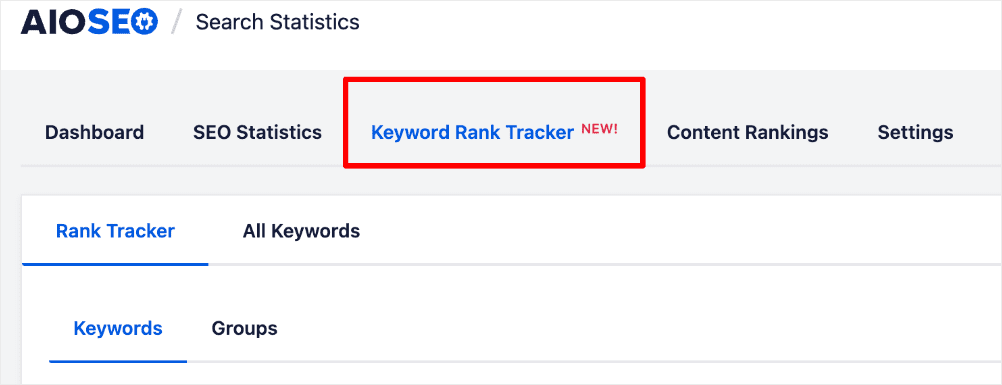
For step-by-step instructions on how to install AIOSEO, check out our installation guide.
Getting Related Keywords Data from AIOSEO
Getting related keywords in WordPress is super easy!
To do so, go to the AIOSEO menu » Search Statistics » Keyword Rank Tracker » All Keywords » Keywords.

Once here, select the keyword for which you would like to get related keywords for and expand the row by clicking on the “expand arrow”.

When you do this, a window opens where you will see the related keywords. These are pulled directly from Google.
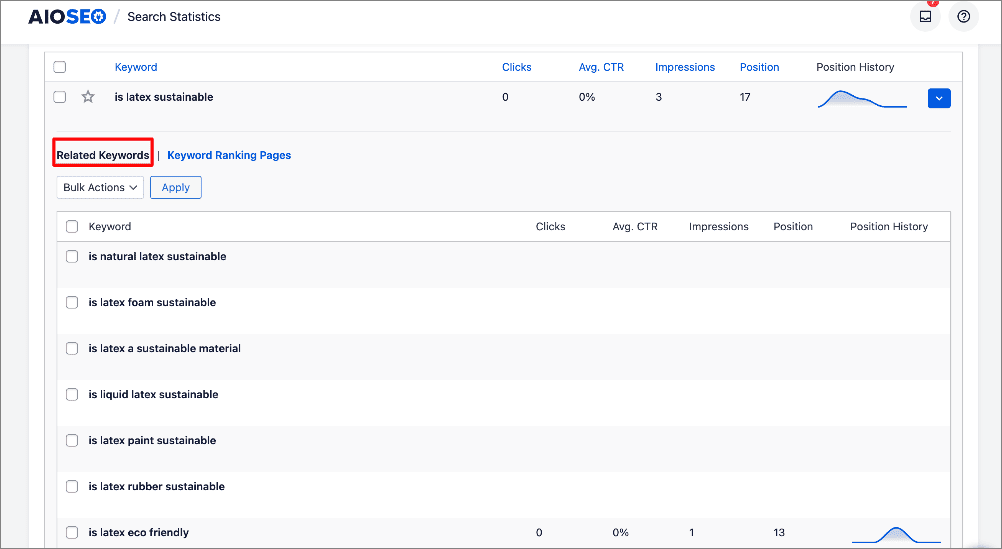
One of the biggest advantages of finding related keywords this way is that you can easily add select keywords to your list of tracked keywords. To do so, select the keywords you want to add and click Bulk Actions » Add.
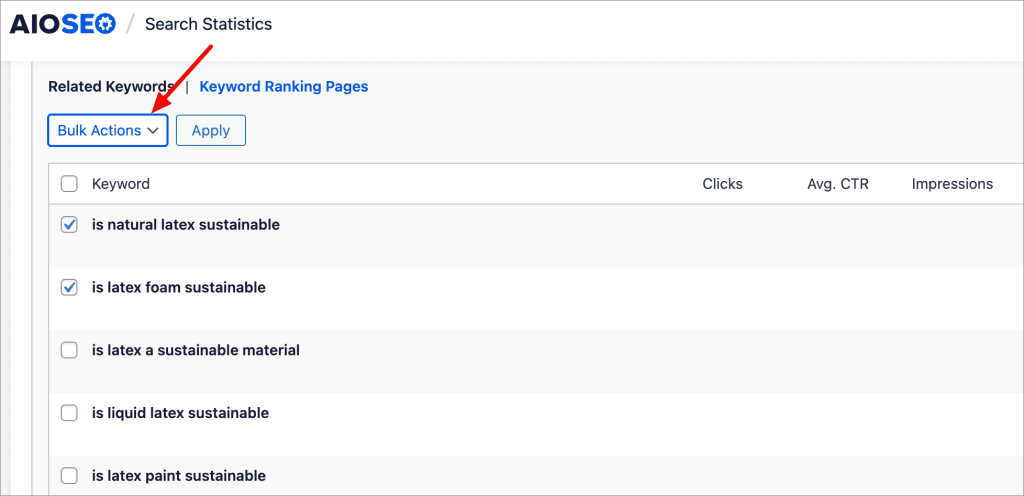
Clicking the Add option opens a window where you can add and edit the keywords you want to track.
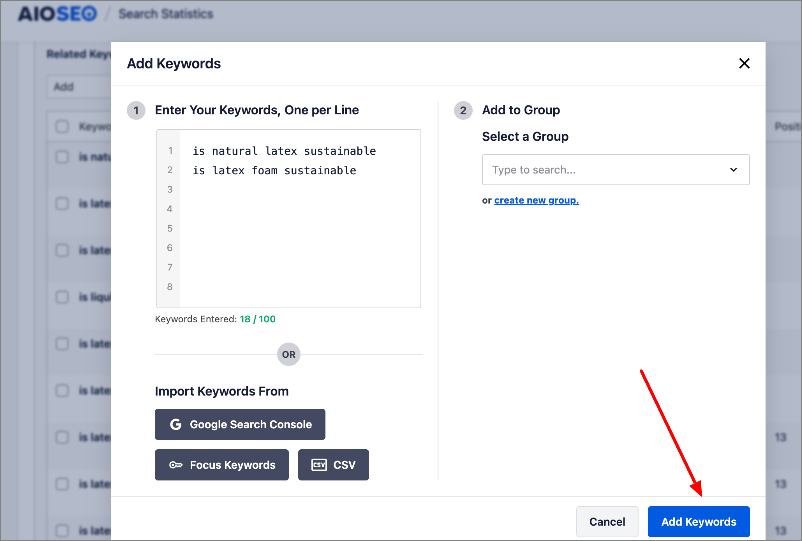
For more details, check out our tutorial on tracking keyword rankings in WordPress.
Let’s look at an example.
Imagine you’re focusing on “healthy eating.” The Keyword Rank Tracker might suggest related terms like “balanced diet,” “meal prep ideas,” or “nutritional tips.” These suggestions can guide you in creating more comprehensive content that addresses various aspects of healthy eating, ultimately improving your SEO performance.
Leverage LowFruit’s KWFinder
Another super-easy way to find related keywords is to use a keyword research tool like LowFruits.

LowFruits is a unique keyword research tool designed to help you discover low-competition keywords. These are perfect for helping you rank your content faster. LowFruits identifies weak spots in the SERPs, allowing you to target keywords with a higher chance of ranking. Most of these are keywords related to your primary keyword.
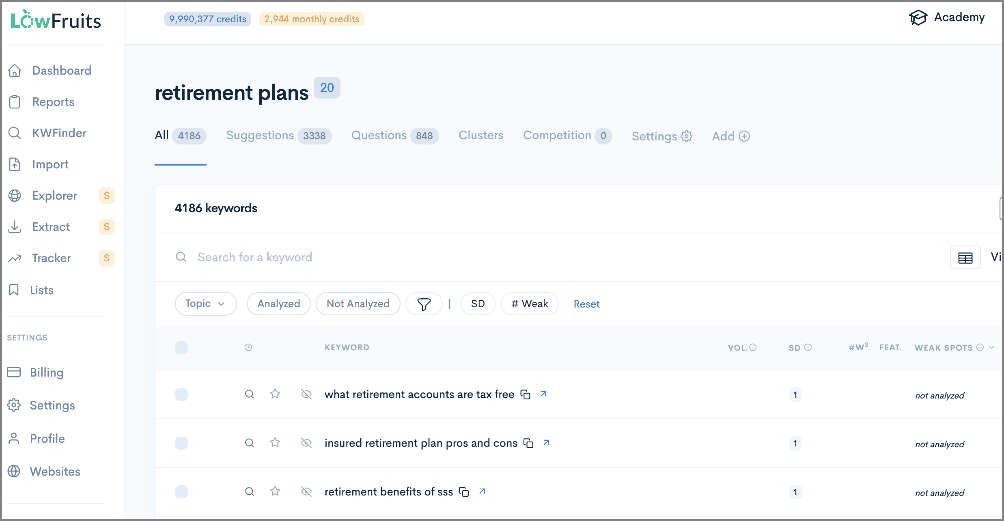
Incorporating this type of low-competition keyword is a fantastic way to get quick SEO wins that drive relevant traffic to your site.
Google Search Console
Another powerful resource for finding related keywords is Google Search Console. This tool offers a treasure trove of data about how your site performs in search results. To find related keywords, start by navigating to the Performance report within Google Search Console. Here, you’ll see a list of queries that are driving traffic to your site.
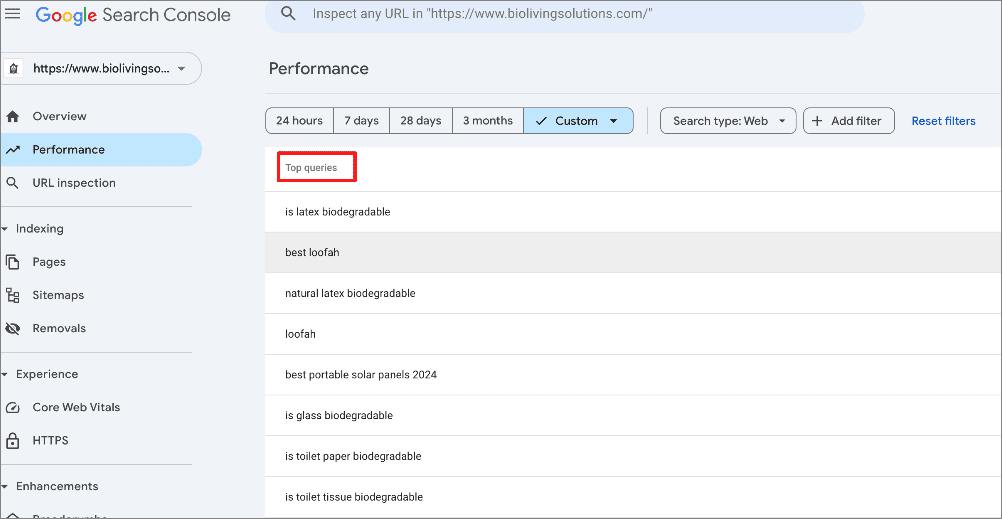
To dig deeper, you can filter these queries to find terms that are semantically linked to your primary keyword. For instance, if you're focusing on “home gardening,” you might discover queries like “best plants for beginners” or “how to grow herbs indoors.” This insight allows you to identify gaps in your content and create new articles or enhance existing ones based on what users are actively searching for.
Google Search Suggestions
Don’t underestimate the power of Google search suggestions! When you start typing a query into Google, it automatically suggests related searches based on what others have looked for. This feature can be a goldmine for finding related keywords.

Additionally, explore the People Also Ask and People Also Search For sections or other SERP features. These sections provide insights into common questions and topics that users are interested in, alongside your primary keyword.
Check out our article on optimizing for Google’s People Also Ask section for more tips.
Check out our article on optimizing for Google’s People Also Ask section for more tips.
Analyzing Competitors
Analyzing competitors is another effective strategy for discovering related keywords. Take a look at the content produced by others in your niche.
What terms are they using? What topics do they cover?
Tools like Ahrefs or SEMrush can help you analyze competitor websites and identify commonly used keywords and phrases. You can also conduct competitor analysis using AIOSEO’s SEO Analysis feature.
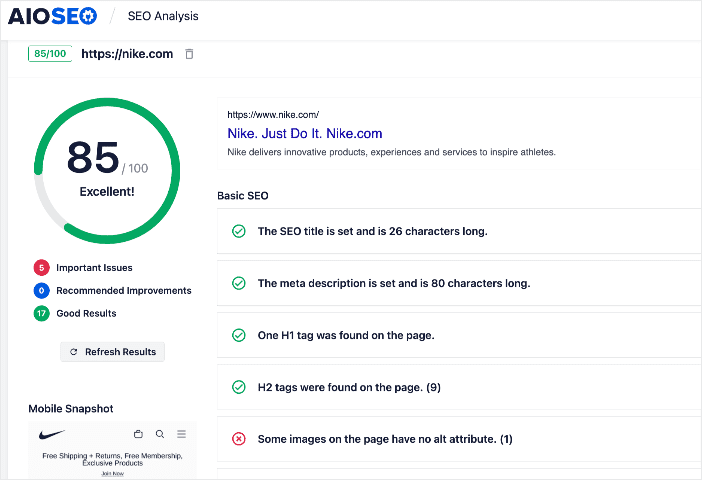
This powerful feature helps you discover your competitor’s SEO strengths and weaknesses.
Regarding related keywords, examine competitor content and look for:
- Keyword gaps: Are they ranking well for keywords that could be valuable for your audience?
- Content gaps: Are there topics they’ve covered extensively that you haven’t touched on yet?
This analysis not only helps you find related keywords but also gives you ideas on how to differentiate your content from theirs.
Exploring Forums, Blogs, and Social Media
Don’t forget about forums, blogs, and social media platforms! Websites like Reddit and Quora are filled with discussions where users ask questions and share information about specific topics. By browsing these platforms, you can uncover common queries and concerns within your niche.
For example, if you're focused on “fitness,” searching through fitness-related subreddits or Quora threads might reveal questions like “what are effective home workouts?” or “how to stay motivated to exercise?” These insights can guide you in creating content that directly addresses user interests and needs.
Additionally, niche Facebook groups can provide valuable insights into trending topics and frequently asked questions among community members. Engaging in these discussions can help you gather ideas for related keywords that resonate with your target audience.
Leveraging AI Tools
Finally, consider leveraging AI tools designed for content creation and keyword research. Many AI-driven platforms can generate semantically related keyword suggestions based on your primary keyword. These tools analyze vast amounts of data to identify terms that are contextually relevant.
For instance, tools like SEOBoost give you tons of related keywords you can incorporate into your content.
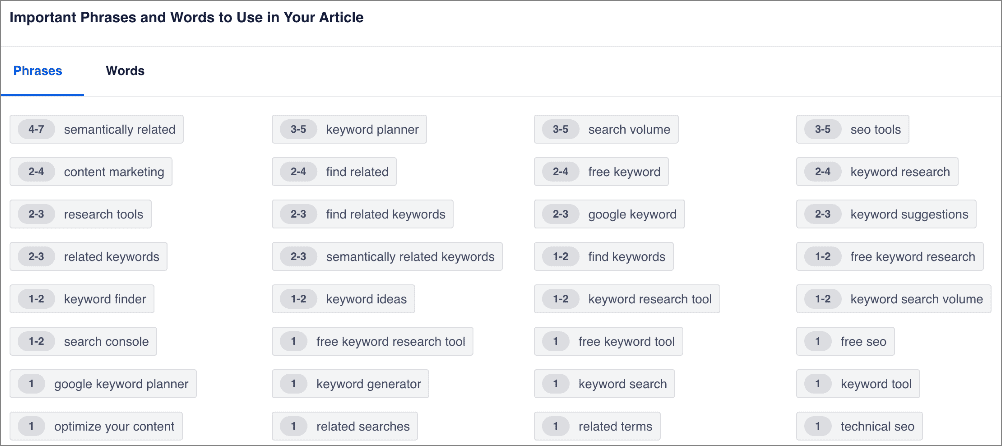
AI SEO tools can provide insights into related keywords while also suggesting how to optimize your content effectively. By using AI tools, you can quickly gather a list of related keywords that enhance the depth of your articles without spending hours on manual research.
Benefits of Using Related Keywords in Your Content
Incorporating related keywords into your content strategy isn't just a nice-to-have. It has many benefits that can significantly enhance your online presence. Here are my top ones:
Improved Search Rankings
One of the most compelling benefits of using related keywords is the potential for improved search rankings. When you target multiple related keywords, you increase your chances of ranking for various queries. Think about it: if your primary keyword is “healthy recipes,” incorporating related terms like “nutritious meal ideas” or “quick healthy dinners” allows you to capture a wider audience. This means that even if someone searches for a slightly different phrase, your content still has a chance to pop up in their search results.
Search engines like Google are designed to provide users with the most relevant results. By using related keywords, you’re essentially giving Google more context about what your content is about. This can lead to higher rankings not just for your primary keyword but also for those related terms, expanding your reach and driving more organic traffic to your site.
Better User Experience
Next up is the better user experience (UX) that comes from using related keywords. When you include a variety of terms that cover a broader range of user needs and questions, you create content that feels more comprehensive and informative. For instance, if someone is searching for “dog training tips,” and your article also covers “puppy socialization techniques” and “common dog behavior problems,” you're not just answering one question; you're addressing multiple aspects of the topic.
This approach not only keeps readers engaged but also builds trust. Users appreciate content that anticipates their questions and provides valuable information. A well-rounded article helps them find what they’re looking for without jumping from one source to another, enhancing their overall experience on your site.
Higher Visibility in Search Results
Using related keywords can lead to higher visibility in search results. Targeting multiple keywords within your content increases the likelihood of appearing in various search queries. This means that instead of just showing up for one specific term, your content could be found by users searching for different but relevant phrases.
Imagine you're writing about “digital marketing strategies.” By including related keywords like “social media marketing,” “content marketing tips,” and “SEO best practices,” you broaden the scope of your article. This helps with ranking and ensures that your content appears in front of a larger audience, which can drive more clicks and visits to your site.
Reducing Keyword Stuffing
Finally, let’s talk about keyword stuffing. Over-optimizing a single term can make your content feel forced and unnatural. It’s easy to fall into the trap of repeating the same keyword repeatedly to rank higher, but this can actually backfire. Search engines are now sophisticated enough to penalize sites that engage in keyword stuffing.
You can maintain a natural flow in your writing by using related keywords while still optimizing for search engines and having a healthy keyword density. Instead of cramming the same term into every paragraph, you can use synonyms and variations that keep your content engaging and readable. This helps with SEO and makes for a more enjoyable reading experience for your audience.
So next time you're crafting an article or blog post, remember to think beyond just the primary keyword—your audience (and Google) will thank you!
Measuring the Impact of Your Related Keywords
Monitoring the impact of your related keywords on your SEO strategy is crucial. Thankfully, this can be done right inside your WordPress dashboard using AIOSEO’s Keyword Rank Tracker.
That’s right, the same module you used to find related keywords. Now that you’ve added them to your list of keywords to keep tabs on, it’s super easy to see how they’re performing.
First, add the keywords you want to track. You can do this by navigating to Keyword Rank Tracker » Keywords.
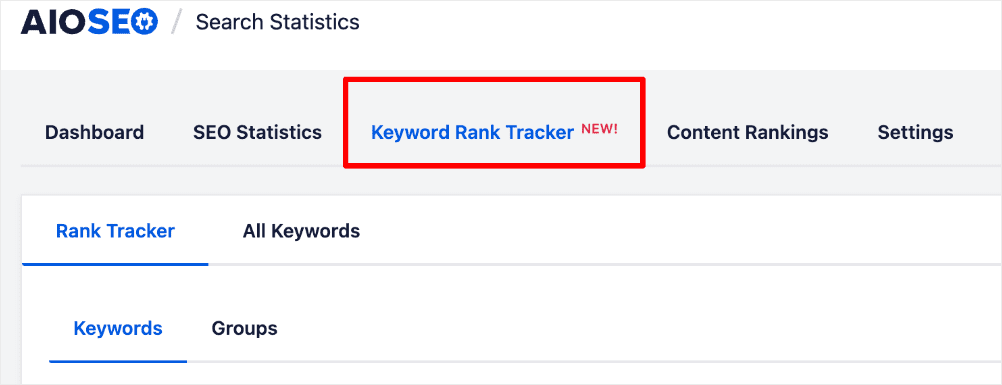
Here, you can add the keywords whose rankings you want to track.

There are 4 ways you can do this, including:
- Manually adding the keywords you want to track.
- Import keywords from focus keywords in your posts.
- Import keywords from a CSV file for quick setup.
- Importing keywords from Google Search Console
Once you’ve added your keywords, the Keyword Rank Tracker shows you an overview of all your keywords:
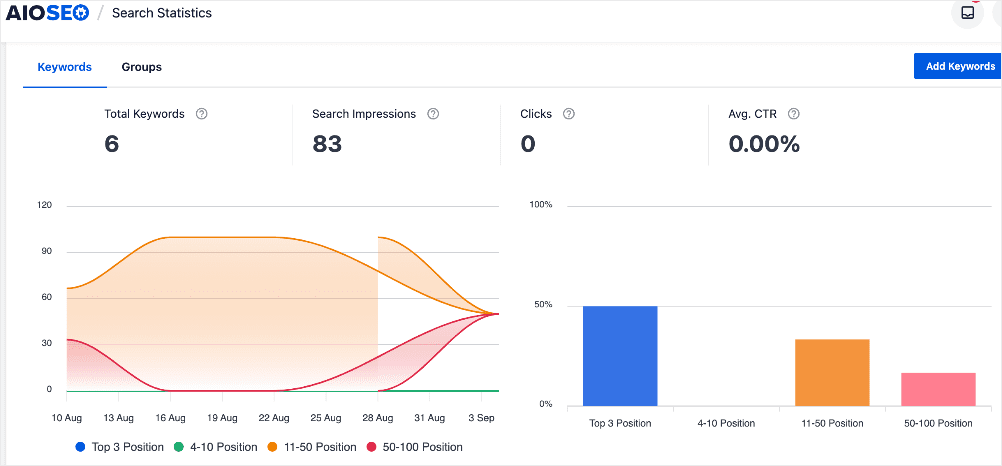
It also shows your rankings for each keyword:
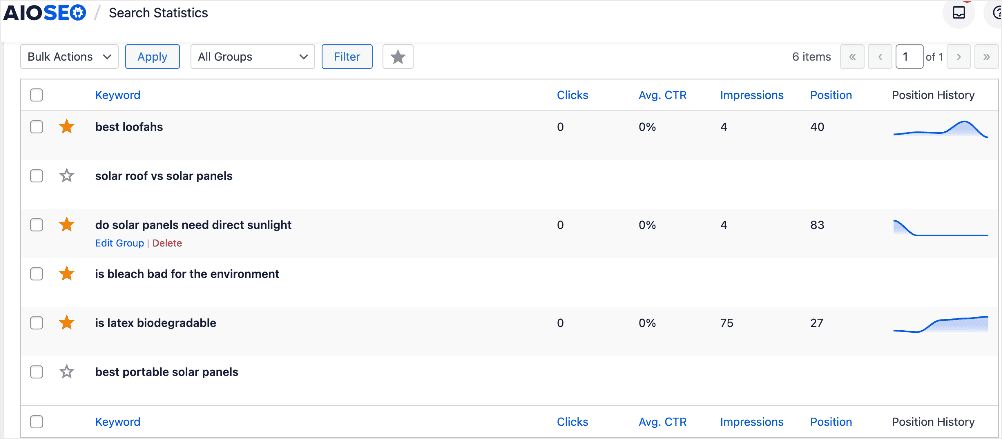
For those keywords ranking beyond position 100, it won’t show any data. If they are important to you, consider optimizing your content for them and their related keywords.
Besides checking keywords you’re ranking for, you can also broaden your performance monitoring to include content performance. This can be done using the Content Performance tab in Search Statistics.

This will show you which posts or pages are ranking well and those dropping in rankings.
For detailed information, check out our guide on SEO reporting.
What are Related Keywords? Your FAQs Answered
We hope this post has helped you know what related keywords are and how to use them in your SEO workflow. You may also want to check out other articles on our blog, like our guide to Google’s Helpful Content Update (HCU) or our guide to cornerstone content.
If you found this article helpful, then please subscribe to our YouTube Channel. You’ll find many more helpful tutorials there. You can also follow us on X (Twitter), LinkedIn, or Facebook to stay in the loop.
Disclosure: Our content is reader-supported. This means if you click on some of our links, then we may earn a commission. We only recommend products that we believe will add value to our readers.
